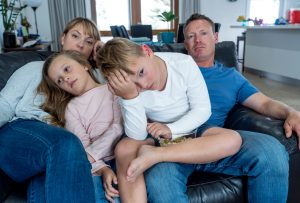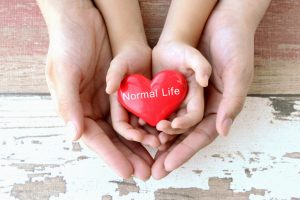Overcoming 3 Common ADHD Parenting Struggles during COVID
 Many families living with ADHD feel bogged down right now. As the COVID winter drags on, remote/hybrid learning combined with parents’ professional responsibilities are beyond tiresome. Families are arguing more than they would like as everybody’s fed up and kids are often pushing back. Although we can see a light at the end of this long pandemic tunnel, we’re not there yet. What can you do today to ease the tension in your life and improve connections with your child or teen? Improving cooperation at home means starting with listening and observing what your kids are saying and showing you with their words and behaviors. Most kids with ADHD are well beyond their coping comfort zone. They’ve stretched and adapted to this year of online school, social distancing and peer isolation as much as they can. They’ve relied on screens for their education, their play and their socializing. Many are regressing in terms of self-reliant living skills and they are depending on you in ways they haven’t in a long time. They may well be acting out towards you because they can’t contain their anger, anxiety or frustration any longer. You are their safe harbor. It’s so tough not to react in these explosive moments but self-Control and Compassion are what’s called for. As long as you import whatever negativity they are exporting and react strongly, your upset becomes their focus. They’ve succeeded in getting rid of their unmanageable emotions and can blame you for being unreasonable instead. But this isn’t a healthy solution. Instead, manage yourself with whatever tools you can (breathing, using the bathroom, drinking some water) and use reflective listening to mirror what you hear them saying. Make sure you set ground rules with logical consequences (not punishments) for physical behaviors such as kicking, hitting or breaking things or using inappropriate language. Tell them, if you do X, you will not earn Y. Limits help kids understand that their choices affect others. Once you are steadier, you can address your family’s current challenges. I’m hearing about three main themes from people: stress, negativity and boredom that lie at the core of many difficulties. Let’s look at each of them.
Many families living with ADHD feel bogged down right now. As the COVID winter drags on, remote/hybrid learning combined with parents’ professional responsibilities are beyond tiresome. Families are arguing more than they would like as everybody’s fed up and kids are often pushing back. Although we can see a light at the end of this long pandemic tunnel, we’re not there yet. What can you do today to ease the tension in your life and improve connections with your child or teen? Improving cooperation at home means starting with listening and observing what your kids are saying and showing you with their words and behaviors. Most kids with ADHD are well beyond their coping comfort zone. They’ve stretched and adapted to this year of online school, social distancing and peer isolation as much as they can. They’ve relied on screens for their education, their play and their socializing. Many are regressing in terms of self-reliant living skills and they are depending on you in ways they haven’t in a long time. They may well be acting out towards you because they can’t contain their anger, anxiety or frustration any longer. You are their safe harbor. It’s so tough not to react in these explosive moments but self-Control and Compassion are what’s called for. As long as you import whatever negativity they are exporting and react strongly, your upset becomes their focus. They’ve succeeded in getting rid of their unmanageable emotions and can blame you for being unreasonable instead. But this isn’t a healthy solution. Instead, manage yourself with whatever tools you can (breathing, using the bathroom, drinking some water) and use reflective listening to mirror what you hear them saying. Make sure you set ground rules with logical consequences (not punishments) for physical behaviors such as kicking, hitting or breaking things or using inappropriate language. Tell them, if you do X, you will not earn Y. Limits help kids understand that their choices affect others. Once you are steadier, you can address your family’s current challenges. I’m hearing about three main themes from people: stress, negativity and boredom that lie at the core of many difficulties. Let’s look at each of them.
Stress:
Whether it’s food, job or housing insecurity, pressure from work or school demands, everybody has a shorter fuse these days. Some of the tension comes from having unrealistic expectations of ourselves and our children based on how people performed previously. Many kids with and without ADHD have lost some of their coping skills. You can assist them by adjusting your expectations to the reality of the present situation. Whatever children and teens were able to accomplish in pre-COVID school and life may be very different from what they can do now. If your child or teen is really struggling to attend classes and do the work, arrange a meeting with the school right away and talk about what types of support and alternative learning options are available. At home, have a family meeting about chores that includes when to do them and any supervision your child may need. Link their “have-to” tasks to their “want-to” activities and have them earn bonus screen time, family games or picking the take-out menu. Shift the bar and re-establish the bare minimum. You can always raise it again when the pandemic is over.
Negativity:
All of us continue to live with more worry and frustration than we are accustomed to. Kids feel confused, sometimes despairing, about what they’ve been missing and many have lost hope about the future. It’s difficult for ADHD brains, with their NOW/NOT NOW thinking, to see a better time ahead when the present feels miserable. We’re seeing higher levels of anxiety as ‘what if’ thoughts circulate in kids’ heads and they expect and exaggerate negative outcomes. With higher levels of anxiety, isolation and anger, we’re also observing more depression, particularly in teens, as they have moved on from disappointment to loss of hope or a sense of meaninglessness about their lives. Much as you would like to, it’s impossible to snap your fingers and make everything better. But you can help them shift their perspective. Instead of focusing on what’s not working, on their powerlessness to change things and in their isolation, you can work with them on controlling what they can. Forget about the ‘I should’s” and focus on what they actually CAN do. Talk about resilience fatigue, discuss what coping looks like and start a tradition of naming a high and low (or as one of my clients calls it ‘a happy and a crappy’) at dinner. You want to make small shifts from what isn’t working to paying attention to what is. 
Boredom:
We’ve all got this. Instead of aiming for happiness based on previous levels of activity, aim for satisfaction. Routines that foster predictability and organization are so important for kids, especially those with ADHD. But, that doesn’t mean you can’t shake things up a bit. Together, brainstorm a list of zany things to do:
- have breakfast for dinner once a week;
- make popcorn and have a mandatory family movie night;
- visit a local place you’ve never been and have wanted to check out;
- return to a favorite ice cream parlor that’s a car drive or bus ride away;
- host a short zoom dance party in your living room and let each family member pick a song;
- have an ongoing card game or puzzle.
Ask your friends for ideas of things they’ve been doing to break up the monotony. Make the effort to leave the house a few times a week, if not daily. Go outside to parks, trails or walking paths you’ve not visited before. Exercise with your kids so you all get moving. The fresh air, sunlight and nature will lift all of your spirits. 
Learn more:
